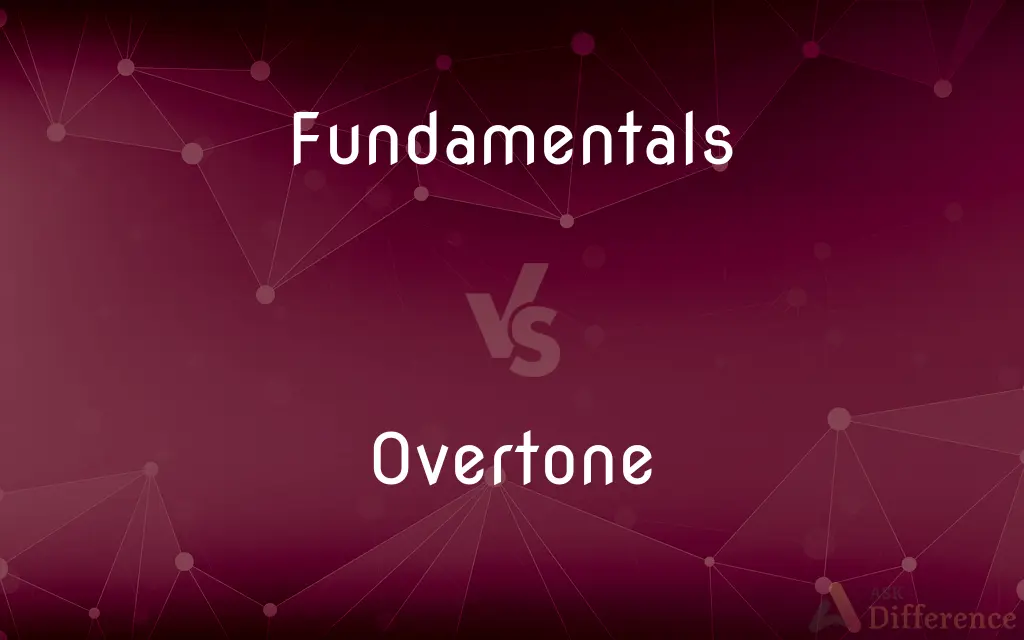Fundamentals vs. Overtone — What's the Difference?
By Tayyaba Rehman — Updated on November 4, 2023
Fundamentals refer to the core principles or building blocks of a subject or system, while overtones are subtle or additional qualities, implications, or harmonics beyond the basics.

Difference Between Fundamentals and Overtone
Table of Contents
ADVERTISEMENT
Key Differences
Fundamentals are the essential components that form the foundation of any structure, concept, or practice. They represent the basic elements without which a system cannot function. Overtones, in contrast, are not essential but are additional features that add depth or complexity.
In learning, mastering the fundamentals is often the first step, providing the necessary groundwork for advanced understanding. Overtones, however, may only become apparent or relevant once the fundamentals are well understood and provide nuance to the basic knowledge.
The term "fundamentals" implies necessity and importance, often associated with education, training, or the intrinsic parts of a complex whole. "Overtones" suggests additional layers that may enhance or influence perception but are not required for the core function.
Fundamentals are generally objective, clear-cut, and universally agreed upon within their context. Overtones can be subjective, varying from one observer to another, and are often open to interpretation based on individual perception or cultural context.
In music, fundamentals refer to the basic pitches, rhythms, and harmonics that constitute a piece. Overtones in music are the complex harmonics that occur above the fundamental pitch, enriching the sound but not altering the basic tune.
ADVERTISEMENT
Comparison Chart
Definition
Basic principles or elements
Subtle additions or implications
Necessity
Essential for function and structure
Non-essential, but enhance experience
In Music
Basic pitch or rhythm
Harmonics above the fundamental pitch
Learning
First concepts taught and understood
Explored after mastering the basics
Perception
Objective and foundational
Subjective and interpretative
Compare with Definitions
Fundamentals
Core Principles
The fundamentals of mathematics are addition, subtraction, multiplication, and division.
Overtone
Subtle Implications
His compliment came with an overtone of sarcasm.
Fundamentals
Foundational Knowledge
Understanding the fundamentals of physics is crucial for engineers.
Overtone
Harmonic Sound
The singer's voice had a rich overtone that filled the room.
Fundamentals
Basic Techniques
Learning the fundamentals of cooking can lead to culinary mastery.
Overtone
Implicit Meaning
The novel's overtone of dystopia adds depth to its narrative.
Fundamentals
Essential Elements
A strong story relies on the fundamentals of plot, character, and setting.
Overtone
Cultural Nuance
The ceremony has significant cultural overtones that influence its meaning.
Fundamentals
Primary Components
The car's engine has many parts, but the fundamentals are the pistons and valves.
Overtone
Additional Quality
The wine had an overtone of oak due to barrel aging.
Fundamentals
Of or relating to the foundation or base; elementary
The fundamental laws of the universe.
Overtone
An overtone is any frequency greater than the fundamental frequency of a sound. In other words, overtones are higher pitches resulting from the lowest note or fundamental.
Fundamentals
Forming or serving as an essential component of a system or structure; central
An example that was fundamental to the argument.
Overtone
An ulterior, usually implicit meaning or quality; an implication or a hint
An overtone of anger barely masked.
Praise with overtones of envy.
Fundamentals
Of great significance or entailing major change
A book that underwent fundamental revision.
Overtone
See harmonic.
Fundamentals
Of or relating to the lowest possible frequency or the lowest frequency component of a vibrating element, system, periodic wave, or quantity
A fundamental chord.
Overtone
A tone whose frequency is an integer multiple of another; a member of the harmonic series.
Fundamentals
(Music) Having the root in the bass
A fundamental chord.
Overtone
An implicit message (in a film, book, verbal discussion or similar) perceived as overwhelming the explicit message.
Fundamentals
Something that is an essential or necessary part of a system or object.
Overtone
(transitive) To give an overtone to.
Fundamentals
The lowest frequency of a periodically varying quantity or of a vibrating system.
Overtone
One of the harmonics faintly heard with and at a higher frequency than a fundamental tone as it dies away, produced by some aliquot portion of the vibrating sting or column of air which yields the fundamental tone; one of the natural harmonic scale of tones, as the octave, twelfth, fifteenth, etc.; an aliquot or "partial" tone; a harmonic. See Harmonic, and Tone.
Fundamentals
Plural of fundamental
Overtone
(usually plural) an ulterior implicit meaning or quality;
Overtones of despair
Fundamentals
(finance) The fundamental analysis data.
While this stock has been trading at a low P/E multiple lately, I think its fundamentals are sound, and consider it a good buy for long-term investors.
Overtone
A harmonic with a frequency that is a multiple of the fundamental frequency
Fundamentals
Principles from which other truths can be derived;
First you must learn the fundamentals
Let's get down to basics
Common Curiosities
Can overtones change the basics?
No, overtones add depth or complexity but do not change the fundamental aspects.
Why are fundamentals important?
Without understanding fundamentals, it's difficult to grasp more complex concepts or structures.
What exactly are fundamentals?
Fundamentals are the basic, core principles or elements that form the foundation of a subject.
How do fundamentals differ in various fields?
While the concept of being foundational is universal, the specifics of fundamentals vary greatly across different disciplines.
Are overtones always present?
Overtones may not always be evident and often require a deeper understanding to perceive.
Do overtones affect the overall impact?
Yes, overtones can significantly affect the perception and impact of an experience or piece of work.
Is it possible to have overtones without fundamentals?
No, overtones are dependent on the existence of fundamentals as they are additional, not standalone elements.
Do fundamentals evolve over time?
While they can be refined, the core nature of fundamentals tends to remain stable.
Are overtones always intentional?
Not always; sometimes overtones are natural byproducts or unintended consequences.
Is mastery of fundamentals essential before exploring overtones?
Generally, yes, a solid grasp of fundamentals is recommended to fully appreciate overtones.
Can someone sense overtones right away?
Sensing overtones usually requires some expertise or familiarity with the subtleties of the subject.
Are fundamentals universally agreed upon?
Yes, within any given field, what constitutes the fundamentals is typically well established.
Can overtones be measured or quantified?
Overtones, especially in subjective contexts, are often qualitative and not easily measured.
Are overtones considered advanced knowledge?
Yes, overtones often represent a more nuanced understanding and are considered advanced.
How are fundamentals taught?
Fundamentals are usually taught through direct instruction and foundational exercises.
Share Your Discovery

Previous Comparison
Provided vs. Providing
Next Comparison
Lobby vs. FoyerAuthor Spotlight
Written by
Tayyaba RehmanTayyaba Rehman is a distinguished writer, currently serving as a primary contributor to askdifference.com. As a researcher in semantics and etymology, Tayyaba's passion for the complexity of languages and their distinctions has found a perfect home on the platform. Tayyaba delves into the intricacies of language, distinguishing between commonly confused words and phrases, thereby providing clarity for readers worldwide.












































